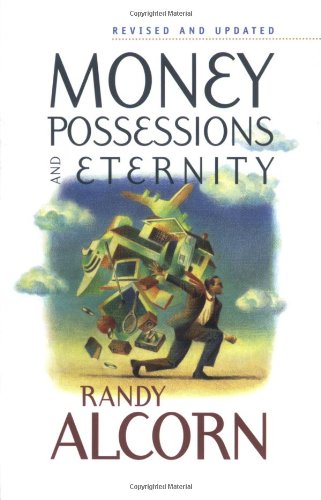What does the Bible really say about money? This completely revised and updated version of the classic best-seller provides a Christian perspective about money and material possessions based on the author’s painstaking study of the Bible. Randy Alcorn uses the Scriptures to approach this often touchy subject head-on. Thought-provoking arguments challenge readers to rethink their attitudes and use their God-given resources in ways that will have an eternal impact. Alcorn deals straightforwardly with issues of materialism, stewardship, prosperity theology, debt, and more. An excellent choice for group study as well as individual financial guidance. Includes a study guide and appendix with additional resources.
- Quote: “[Jesus] will call us to take action that breaks our bondage to money and possessions and frees us to live under his exclusive lordship” (5).
- Quote: “How we view our money and possessions is of the utmost importance. What we do with our money will … influence the very course of eternity. … [W]e were made for only one person and one place. Jesus is the person and heaven is the place. … If [our purpose pervades our approach to money], the door will be unlocked to exhilarating Christian discipleship, where ‘following Christ’ is not merely a comforting but meaningless cliché; instead it is an electrifying, life-changing reality.” (11)
- Note: Randy Alcorn starts his book aptly with the precedent for scriptural investigation on the topic of money and establishes the significance of stewardship in the life of a believer, i.e., the direct spiritual connection to how one manages his or her resources.
- Quote: “Money is neither a disease nor a cure. It is what it is, nothing less and nothing more. We may use it well or poorly. Either way, how we use money is always of critical importance to our spiritual lives. It has a lasting impact on two worlds – this one and the next.” (19)
- Quote: “The phrase ‘everything God created is good’ is the theological death knell for asceticism. From a biblical perspective, everything is fair game to have and to enjoy, as long as we partake thankfully and prayerfully — unless, of course, what we partake in violates God’s Word.” (21-22)
- Note: Alcorn makes a number of key observations regarding asceticism, most notably being that choosing an ascetic lifestyle can be dangerous and counterproductive to the Christian life because poverty does not equal piety and may spring from impure motives. Oftentimes we are tempted to praise those who choose to live especially simply, but we should not let the outward appearance of one’s life completely color our perception of them since we do not know their whole hearts like God does. Despite asceticism’s negative impacts, however, there are lessons to be learned from ascetics in church history in light of the fact that today’s church suffers more from materialism and would benefit from more examples of simplicity and living with less.
- Quote: “The genesis of materialism was in the Garden of Eden, when the first man and woman chose to follow their appetites rather than God, seeking fulfillment in the one thing he had told them was forbidden. A. W. Tozer describes the ongoing results of their sin and ours: ‘Things have become necessary to us, a development never originally intended … [taking] the place of God.” (31-32)
- Quote: “Materialism can only be corrected by changing our view of God … [which] can only come from a belief in and study of the Scriptures, which tell us about God, and which alone give us the context to understand ourselves and the proper place of money and possessions.” (33)
- Note: Materialism is a deeply ingrained cycle learned by most (or all) Americans simply in the typical abundant lifestyle of our culture that we must consciously reject with the truth that we cannot take possessions with us in death. Alcorn emphasizes the stupidity of materialism, which many Christians do not acknowledge in their daily consumption, saying that it is a foolish choice or purposeful disregard for the toll on our souls that disables our relationship to God.
- Quote: “Satan works on the assumption that every person has a price. Often, unfortunately, he is right. Many people are willing to surrender themselves and their principles to whatever god will bring them the greatest short-term profit.” (41)
- Quote: “John Steinbeck wrote a letter to Adlai Stevenson … recorded in the January 28, 1960 edition of the Washington Post. ‘If I wanted to destroy a nation, I would give it too much, and I would have it on its knees, miserable, greedy, sick.’” (46)
- Note: Ultimate pure joy can only come from God, yet we continue to search for happiness elsewhere. The gain of wealth leads to more possessions, which leads to more worry, which leads to more distraction from God.
- Quote: “As a former pastor and someone with very close relationships with other pastors, I can tell you that Satan is delighted when pastors are underpaid and underappreciated — and he’s just as delighted when they’re overpaid and overappreciated.” (63)
- Quote: “If you’re not acquainted with the original, you can easily be deceived by an imitation.” (72)
- Note: It might be too easy to worship pastors, preachers, or speakers instead of worshipping Jesus. Churches start to get into trouble when they start thinking what they can do for the church instead of what they’re supposed to be doing for God.
- Quote: “John 9:3 ‘Neither this man nor his parents sinned … but this happened so that the work of God might be displayed in his life.’ God had a higher purpose for this man’s adversity that simply didn’t fit into the neat little categories of ‘Do good and you’ll be well off’ and ‘Do bad and you’ll suffer.’” (77)
- Quote: “Christ was saying that those who would follow him in leaving behind what was theirs, would become part of a larger family of faith, whose relationships are deep and freely shared. Everywhere the apostles went they would find ‘homes’ that were theirs[,] … meals prepared from the ‘harvest’ of fields. … They would have brothers and sisters to fellowship with parents to give them wisdom, and children who would learn at their feet and where they would guide into Christ likeness. This sure rich reservoir of relationships and possessions is available today to all who will follow the Lord.” (83)
- Note: Prosperity Theology: the Gospel of Wealth is a relevant thing in the United States. It addresses the attitudes and lifestyles of millions of mainstream Christians who, to varying degrees and sometimes without realizing it, have bought into the lie of prosperity theology. This chapter was insightful; I appreciated how he used so many references to the Bible throughout the chapter.
- Quote:“I have held many things in my hands and I have lost them all. But whatever I have placed in Gods hands, that I still possess.” — Martin Luther (93)
- Quote: “Christ’s primary argument against amassing material wealth isn’t that it’s morally wrong, but simply that it’s a poor investment. Material things just won’t stand the test of time.” (94)
- Note: What I got from this chapter based on my quotes is that all possessions are God’s. Also going by the old country saying of “Don’t put all your chickens in one basket,” Jesus believes that if you put all your investments in one thing without worrying about kingdom wealth, then you will suffer greatly in the presence of a storm or hardship in your life.
- Quote: “If life’s greatest certainty is death, wouldn’t it be foolish not to prepare for what lies beyond this life?” (108)
- Quote: “We were made for a person and a place. Jesus is the person. Heaven is the place. And Jesus is the one building that place for us.” (113)
- Note: Western Christians are focusing too much on now instead of our future in the afterlife. Christians spend money on sports, clothes, and houses that they think will bring happiness, but the real happiness is not here and now; it’s later in the afterlife. God has prepared a place for all of his believers in heaven. He wants us to be there with him, and he will give grace to the righteous but strike down the wicked. Heaven and hell are two very real places. Unlike heaven and its wonder-filled eternity, hell is an eternity filled with agony and suffering. Hell will be the place for the unrighteous and unjust to spend their eternities in agony. And there is no second chance after death for non-believers and lukewarm believers.
- Quote: “Not all Christians will hear the master say, ‘Well done, good and faithful servant.’” (125)
- Quote: “The missing ingredient in the lives of many Christians today is motivation.” (128)
- Note: What comes in the afterlife is a direct result of how we have spent our time on earth. There will be differences among rewards in heaven. The experiences in heaven will not be the same, but our time in heaven will still be wonderful, although other Christians might have a more wonderful time in heaven. As all will be miserable in hell, all will be with joy in heaven. Our belief determines where we will spend our afterlife. Our obedience determines what reward we will have there. Christians should be motivated to do the right thing by their rewards waiting for them in heaven. They should give to the needy so they can have their rewards in the afterlife. Some Christians believe that being motivated by rewards in the afterlife is wrong, but many significant figures in the Bible were influenced by their riches awaiting for them in heaven. As humans, we have our desires not because we’re sinful, but because we are human.
- Quote: “When a man told John Wesley that his house had burned to the ground, Wesley replied, ‘No. The Lord’s house burned to the ground. That means one less responsibility for me.'” (140)
- Quote: “One day money will be useless. While it’s still useful, Christians with foresight will use it for eternal good.” (145)
- Note: J. Wesley was so aware of everything he had being the Lord’s, that when his house burned down, he acknowledged that it was the Lord’s house that burned down. What an incredible way to keep your peace in the midst of trouble. Good thoughts on how money should be used to store up eternal riches instead of worldly wealth.
- Quote: “C.S. Lewis writes: ‘If you read history you will find that the Christians who did most for the present world were just those who thought most of the next.” (159)
- Quote: “As children of God, we are prized by the Prince, chosen by him to reign at his side. Yet, beautiful and beloved as we are to the Prince, we go right on — like Cinderella with amnesia — living in drudgery as citizens of a second-class country, forfeiting heavenly treasures by clinging to earthly ones.” (169)
- Note: To have a great impact on the earth for God’s sake, it helps to lightly hold on to material things of this world by keeping your focus on eternity with Christ. It’s important for children of God to remember who they belong to and what kingdom they belong to. This allows us to not be tied down by the troubles and things of this world, but to be focused on the next world, so that we can be a maximum blessing to others while on earth.

